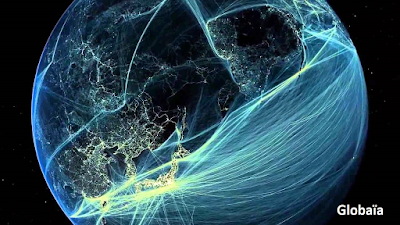Beyond the Anthropocene's common humanity
The Anthropocene concept – formally introduced over a decade ago (2) – has captivated both academics and journalists of late. The conceptʼs renaissance accompanies the broad recognition that the domains of nature and culture are far more entangled than traditionally conceived (3,4). The Anthropocene is helping to frame the range of human-environment interactions more comprehensively than, say, climate change, species loss, deforestation or other narratives of environmental change. The wider world is not waiting for the geologic community to formally recognize a new epoch: unlike plate tectonics or biological evolution, the age of humans seems to have escaped the arduous journey towards broad acceptance.
This growing interest in the Anthropocene presents an opportunity to examine the conceptʼs presuppositions. The key presupposition holds humanity as a whole complicit in transforming the Earthʼs ecosystems and physical processes over the last two hundred years or so (5). In the prevalent discourse on the Anthropocene, the burden of the new epoch seems to rest equally on the planetʼs human inhabitants, past, present and future. This notion conflicts with the fact that it is the decisions and actions of a privileged few that have led to the greatest environmental impacts (6). Ignoring this fact paves the way for a largely descriptive approach to environmental history that does not explore the actions and practices of particular socio-political actors. Such an approach masks the basic ideological underpinnings that determined and continue to determine the unfolding of the Anthropocene epoch (7,8).
“Welcome to the Anthropocene” captures faithfully the descriptive and depoliticized nature of the dominant narrative.
“Welcome to the Anthropocene” captures faithfully the descriptive and depoliticized nature of the dominant narrative. The movie traces the beginning of the Anthropocene to the Industrial Revolution in 18th-century England. It then depicts the spread of this industrialization – and the attendant improvements in human wellbeing – to the rest of Europe and eventually throughout most of the world. The audience learns about how human-induced changes to Earthʼs natural systems have pushed the planet outside the relatively stable Holocene epoch. The movie ends on an optimistic note by invoking our collective capacities for shaping our future just as we have shaped our past. Although a billion malnourished individuals are alluded to, the movie does not delve into where these people reside or indeed why they have ended up in this predicament.
The dominant narrative of the Anthropocene does not address explicitly how the confluence of environmental compulsions, self-interest, exploitation and even sheer chance made some the makers of an epoch and others its unwitting residents. This is not surprising given that until recently the Anthropocene was primarily the concern of natural scientists who are seldom preoccupied with the historical, ethical or cultural dimensions of knowledge. The interpenetration of the natural, the cultural and the social at all scales, however, implies that changes in biogeochemical cycles or land use, power asymmetries, capitalism and technology must all be examined as interlinked phenomena.
We therefore call for a critical normative framework that is rooted in post-colonial theory and the perspective of environmental justice. This approach can help to scrutinize dominant stories, myths and ideologies, and undertake a critical engagement with fundamental questions of meaning, value, responsibility and purpose (7). It can also help us to move beyond a generalized “humanity” and to challenge simplistic narratives of progress.
An analysis of British industrialization and trade during the 1850s (9) provides one example of the potential of a more critical approach to understanding technology and culture. Although Britain was self-sufficient in fossil fuels land was at a premium: land was needed both to grow food and provide raw materials (e.g. cotton) for its burgeoning textile industry. By shifting the production of cotton to its North American colonies and employing slave labour, Britain was able to spare its own land to sustain its growing industrial labour force. As Walter Johnson highlighted in an opinion piece last year in the New York Times (10), “the mills that have come to symbolize the Industrial Revolution and the slave-tilled fields of the South were mutually dependent.”
Calculations suggest that in 1850 Britain gained about 800 per cent in terms of embodied labour and about 60 times the space utilized by exchanging £1000 of cotton textiles for £1000 of raw cotton on the world market (9). The profits thus accrued were invested in further technological development during the coming decades. What was perceived and experienced as progress in one part of the world thus entailed exploitation in another. It is not mere coincidence that the initial upswing in the emission of carbon dioxide was synchronous with European expansionism and early globalization. This analysis shifts the emphasis of the Anthropocene story from a simplistic account of technological innovation to the recognition of unequal exchange and exploitation.
Modern-day globalization has led to the emergence of additional centres of accumulation and consumption, such as the so-called emerging economies of China, India and Brazil. As Margulis and others (11) have pointed out, flows of capital, goods and ideas occur today along axes of power that are more polycentric and defy the simple North/South division. But the political, economic, cultural and discursive regimes of power and hegemonies established early in the epoch of humans still persist. Indeed, the biophysical transformation of the planet is the flip side of capital accumulation, consumption and growth, the broad patterns of which were established in the early Industrial era by the colonial powers.
We therefore call for a critical normative framework that is rooted in post-colonial theory and the perspective of environmental justice.
Technological or institutional solutions to the Anthropoceneʼs challenges are unlikely to be sustainable unless the regimes of power and hegemonies operational today are understood, critiqued and confronted. It has been pointed out that humanity shares a common fate on a wretched planet and that it is in the self-interest of the electorates in all countries, rich and poor, to support global cooperation (12). But unless a normative framework rooted in post-colonialism and environmental justice is articulated for the concept of the Anthropocene, the inhabitants of these new centres of economic growth will not buy into the notion of shared responsibilities. This framework does not deny that planetary stewardship requires a common humanity. Instead, it asserts that shared responsibilities and co-habitation can be best achieved when past imbalances are acknowledged and future injustices addressed.
The perspective of climate justice has informed climate negotiations for the past two decades (for example, the Kyoto Protocol). However, the emphasis on the attribution of and accountability for historical emissions of carbon dioxide has led to a stalemate. When applied to the Anthropocene, this perspective must inform a re-evaluation of the current economic paradigm by demonstrating its rootedness in the exploitation of people and the non-human nature that they are intimately bound up with. This perspective can help to reveal, for example, how technological solutions to environmental problems might simply be strategies to displace the load from one place (and/or time) to another place
(and/or time) (9).
The questions and issues raised by the Anthropocene concept are, at the outset, not answerable by single disciplines. The new epoch calls for a truly transdisciplinary approach that would ultimately focus on what Jason Moore terms as oikeios – the creative, historical, and dialectical relation between, and also always within, human and extra-human natures (4). In that context, it is encouraging to note the recent spurt in interest from anthropologists, historians, humanists and even artists. The critical normative framework sketched above provides one avenue for social scientists and scholars from the humanities to take ownership of the Anthropocene concept and, if needed, rectify the dominant discourse.
*This blog post was co-authored with Sabine Wilke, Professor and
Chair of Germanics at the University of Washington. Originally published
on the Geocritique blog in May 2014 (unfortunately, it is no longer
accessible there).
References
1. Welcome to the Anthropocene. http://vimeo.com/39048998.
2. Crutzen, P and Stoermer, E (2000). “The Anthropocene.” Global Change Newsletter 41: 17-18.
3. Latour, B (1993). We have never been modern. Harvard University Press. Cambridge, MA.
4. Moore, J. W (2013). From object to oikeios: environment-making in the capitalist world-ecology. Unpublished essay (http://www.jasonwmoore.com/uploads/Moore__From_Object_to_Oikeios__for_website__May_2013.pdf)
5. Dibley, B (2012). Nature is us: The Anthropocene and Species-Being. Transformations 21: 1-22.
6. Chakrabarty, D (2009). “The climate of history: four theses.” Critical Inquiry 35: 197-222.
7. Wilke, S (2013). Anthropocenic Poetics: Ethics and Aesthetics in a New Geological Age. Rachel Carson Center perspectives 2013/3: 67-74.
http://www.carsoncenter.uni-muenchen.de/download/publications/pers pectives/2013_perspectives/1303_anthro_ web.pdf
8. Malm A and Hornborg A (2014). The geology of mankind? A critique of the Anthropocene narrative. The Anthropocene Review
9. Hornborg, A (2011). Global ecology and unequal exchange: fetishism in a zero-sum world. Routledge studies in ecological economics. Routledge. London and New York.
10. Johnson, W (2013) King cottonʼs long shadow. http://opinionator.blogs.nytimes.com/2013/03/30/king-cottons-long-shadow/?_php=true&_type=blogs&_r=0, accessed on 30 April 2014.
11. Margulis, M. E., McKeon, N., and Borras Jr, S. M (2013). Land grabbing and global governance: critical perspectives. Globalizations 10: 1-23.
12. Sachs, J. D (2008). Common Wealth: Economics for a Crowded Planet. Penguin. NY.



Comments
Post a Comment